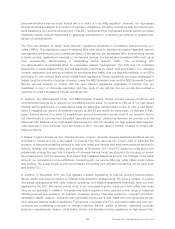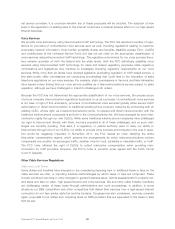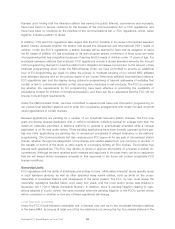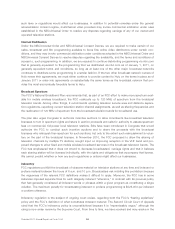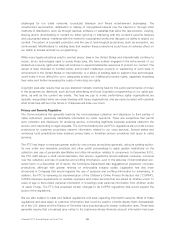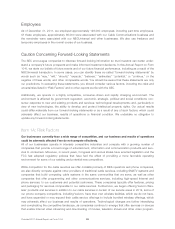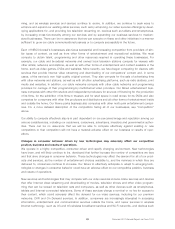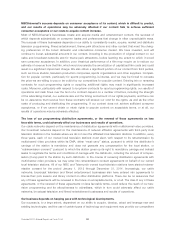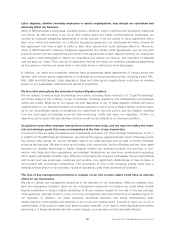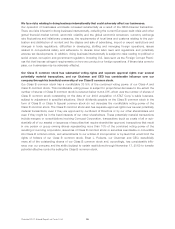Comcast 2011 Annual Report Download - page 28
Download and view the complete annual report
Please find page 28 of the 2011 Comcast annual report below. You can navigate through the pages in the report by either clicking on the pages listed below, or by using the keyword search tool below to find specific information within the annual report.challenges for our cable networks, broadcast television and filmed entertainment businesses. The
unauthorized reproduction, distribution or display of copyrighted material over the Internet or through other
methods of distribution, such as through devices, software or websites that allow the reproduction, viewing,
sharing and/or downloading of content by either ignoring or interfering with the content’s security features
and copyrighted status, interferes with the market for copyrighted works and disrupts our ability to exploit our
content. The extent of copyright protection and the use of technological protections, such as encryption, are
controversial. Modifications to existing laws that weaken these protections could have an adverse effect on
our ability to license and sell our programming.
While many legal protections exist to combat piracy, laws in the United States and internationally continue to
evolve, as do technologies used to evade these laws. We have actively engaged in the enforcement of our
intellectual property rights and likely will continue to expend substantial resources to protect our content. The
repeal of laws intended to combat piracy and protect intellectual property or weakening of such laws or
enforcement in the United States or internationally, or a failure of existing laws to adapt to new technologies,
could make it more difficult for us to adequately protect our intellectual property rights, negatively impacting
their value and further increasing the costs of enforcing our rights.
Copyright laws also require that we pay standard industry licensing fees for the public performance of music
in the programs we distribute, such as local advertising and local origination programming on our cable sys-
tems, as well as the content we create. The fees we pay to music performance rights organizations are
typically renegotiated when we renew licenses with those organizations, and we cannot predict with certainty
whatthosefeeswillbeinthefutureor if disputes will arise over them.
Privacy and Security Regulation
The Communications Act generally restricts the nonconsensual collection and disclosure to third parties of
cable customers’ personally identifiable information by cable operators. There are exceptions that permit
such collection and disclosure for rendering service, conducting legitimate business activities related to the
service, and responding to legal requests. The Communications Act and FCC regulations also provide privacy
protections for customer proprietary network information related to our voice services. Several states and
numerous local jurisdictions have enacted privacy laws or franchise privacy provisions that apply to cable
services.
The FTC has begun to exercise greater authority over privacy protections generally, using its existing author-
ity over unfair and deceptive practices and other public proceedings to apply greater restrictions on the
collection and use of personally identifiable and other information relating to consumers. In December 2010,
the FTC staff issued a draft recommendation that privacy regulations should address consumer concerns
over the collection and use of personal and profiling information, even in the absence of demonstrated con-
sumer harm. In a December 2010 report, the Commerce Department also suggested an expansion of privacy
protections, although with greater reliance on enforceable industry codes. Legislation has also been
introduced in Congress that would regulate the use of personal and profiling information for advertising. In
addition, the FTC is reviewing its implementation of the Children’s Online Privacy Protection Act (“COPPA”).
COPPA imposes requirements on website operators and online services that are aimed at children under 13
years of age or that collect personal information or knowingly post personal information from children under
13 years of age. The FTC has proposed certain changes to its COPPA regulations that would expand the
scope of the regulations.
We are also subject to state and federal regulations and laws regarding information security. Most of these
regulations and laws apply to customer information that could be used to commit identity theft. Substantially
all of the U.S. states and the District of Columbia have enacted security breach notification laws. These laws
generally require that a business give notice to its customers whose financial account information has been
Comcast 2011 Annual Report on Form 10-K 26





